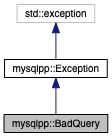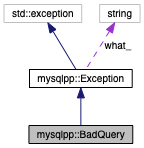Exception thrown when the database server encounters a problem while processing your query. More...
#include <exceptions.h>


Public Member Functions | |
| BadQuery (const char *w="", int e=0) | |
| Create exception object. More... | |
| BadQuery (const std::string &w, int e=0) | |
| Create exception object. More... | |
| int | errnum () const |
| Return the error number corresponding to the error message returned by what() More... | |
 Public Member Functions inherited from mysqlpp::Exception Public Member Functions inherited from mysqlpp::Exception | |
| Exception (const Exception &e) MAY_THROW() | |
| Create exception object as copy of another. | |
| Exception & | operator= (const Exception &rhs) throw () |
| Assign another exception object's contents to this one. | |
| ~Exception () throw () | |
| Destroy exception object. | |
| virtual const char * | what () const throw () |
| Returns explanation of why exception was thrown. | |
Additional Inherited Members | |
 Protected Member Functions inherited from mysqlpp::Exception Protected Member Functions inherited from mysqlpp::Exception | |
| Exception (const char *w="") throw () | |
| Create exception object. | |
| Exception (const std::string &w) throw () | |
| Create exception object. | |
 Protected Attributes inherited from mysqlpp::Exception Protected Attributes inherited from mysqlpp::Exception | |
| std::string | what_ |
| explanation of why exception was thrown | |
Detailed Description
Exception thrown when the database server encounters a problem while processing your query.
Unlike most other MySQL++ exceptions, which carry just an error message, this type carries an error number to preserve Connection::errnum()'s return value at the point the exception is thrown. We do this because when using the Transaction class, the rollback process that occurs during stack unwinding issues a query to the database server, overwriting the error value. This rollback should always succeed, so this effect can fool code that relies on Connection::errnum() into believing that there was no error.
Beware that in older versions of MySQL++, this was effectively the generic exception type. (This is most especially true in v1.7.x, but it continued to a lesser extent through the v2.x series.) When converting old code to new versions of MySQL++, it's therefore possible to get seemingly "new" exceptions thrown, which could crash your program if you don't also catch a more generic type like mysqlpp::Exception or std::exception.
Constructor & Destructor Documentation
◆ BadQuery() [1/2]
|
inlineexplicit |
Create exception object.
- Parameters
-
w explanation for why the exception was thrown e the error number from the underlying database API
◆ BadQuery() [2/2]
|
inlineexplicit |
Create exception object.
- Parameters
-
w explanation for why the exception was thrown e the error number from the underlying database API
Member Function Documentation
◆ errnum()
|
inline |
Return the error number corresponding to the error message returned by what()
This may return the same value as Connection::errnum(), but not always. See the overview documentation for this class for the reason for the difference.
The documentation for this class was generated from the following file: